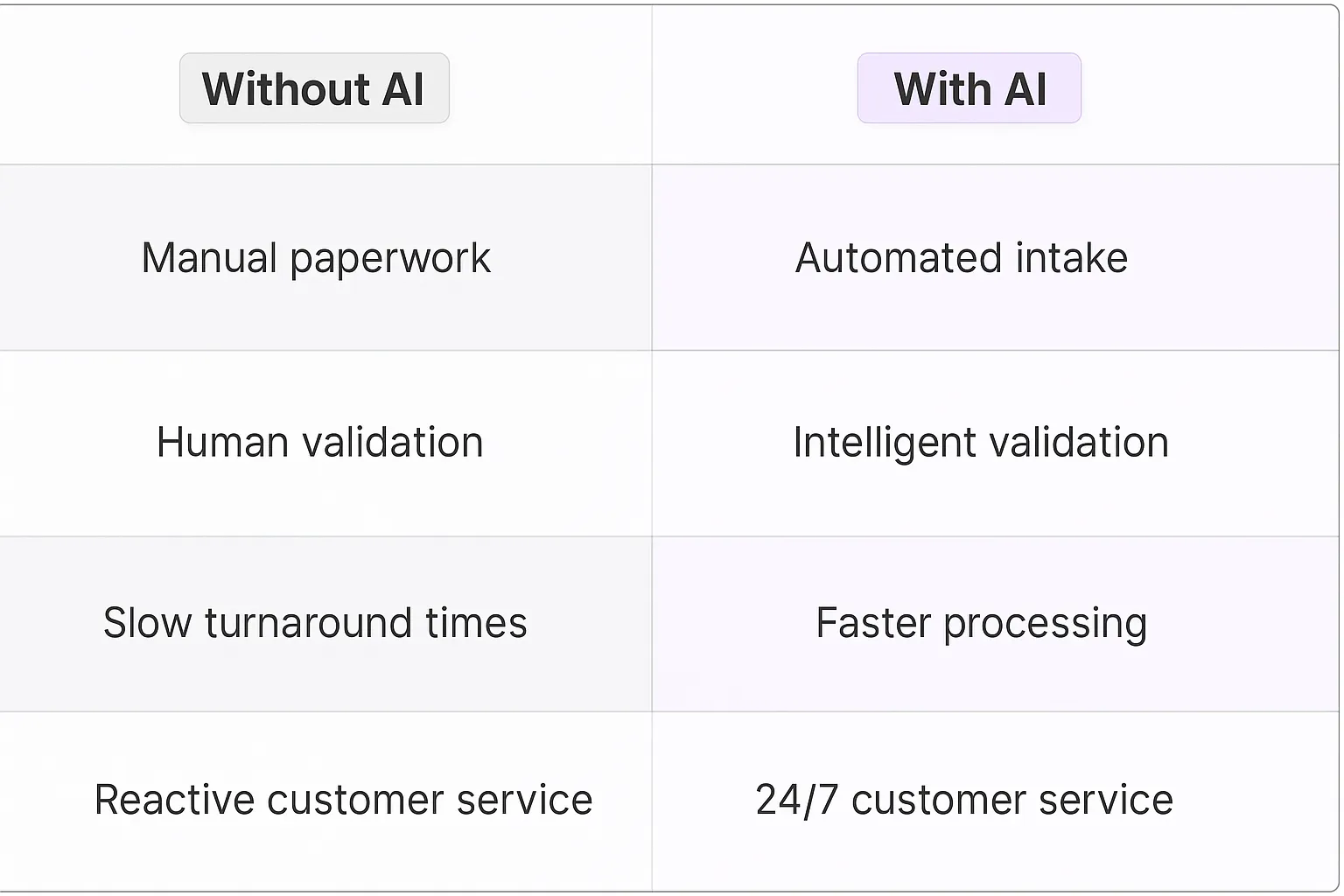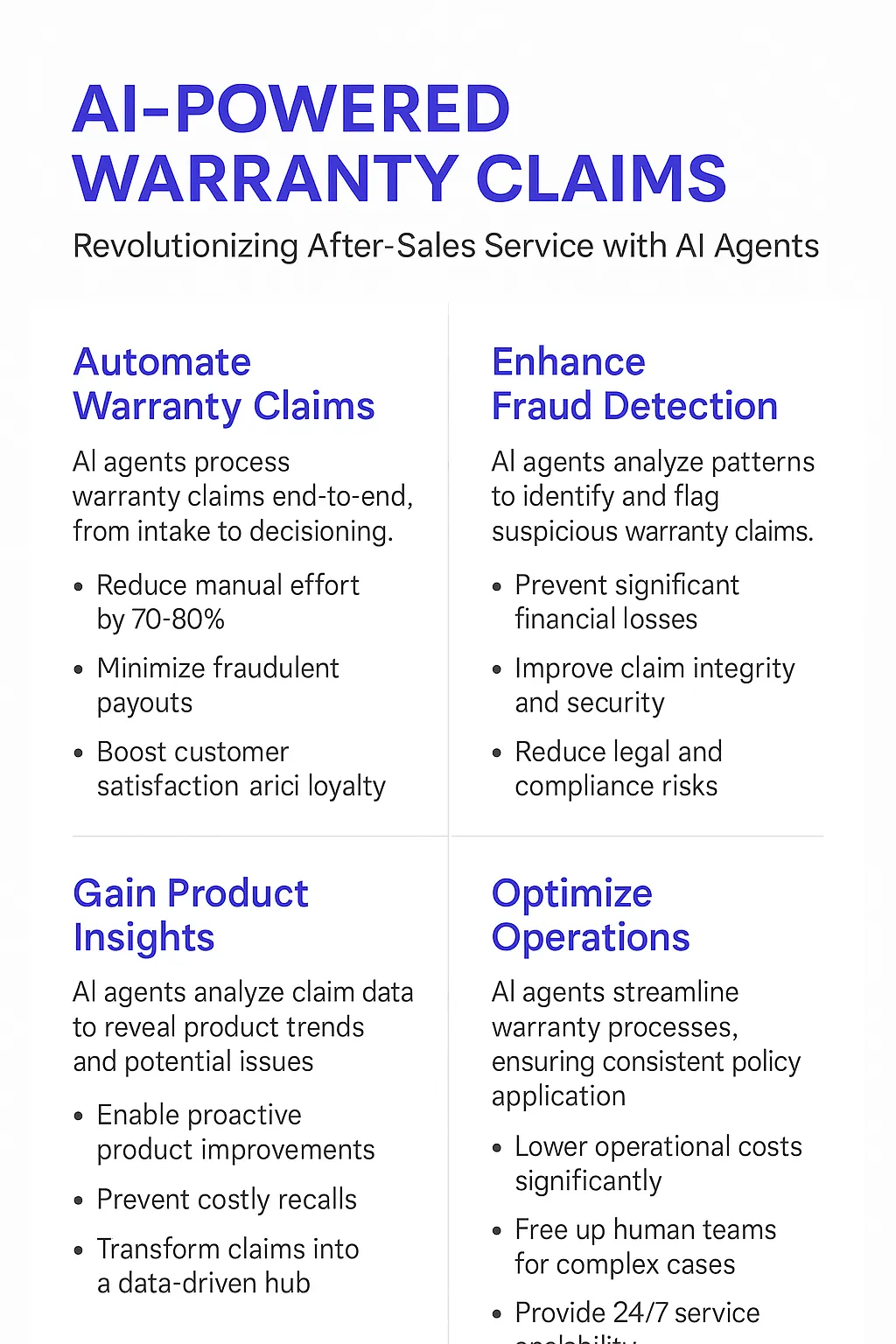Warranty Claims Processing AI Agents
The Evolution of Warranty Claims Processing with AI Agents
Warranty claims processing is the backbone of after-sales service in many industries. It's the process of validating, approving, and fulfilling customer claims for product repairs or replacements under warranty. Traditionally, this has been a labor-intensive operation, often plagued by delays, inconsistencies, and customer frustration. Enter AI agents - the game-changers that are redefining how companies handle these critical customer touchpoints.
AI-powered warranty claims processing brings a suite of features that are transforming the landscape:1. Automated intake and triage: AI agents can instantly categorize and prioritize incoming claims.2. Intelligent validation: These digital teammates cross-reference claims against warranty terms and product histories in milliseconds.3. Consistent decision-making: AI applies rules uniformly, eliminating human bias and fatigue.4. Predictive maintenance: By analyzing claim data, AI can identify potential product issues before they become widespread.5. 24/7 customer service: AI agents provide round-the-clock claim submission and status updates.6. Fraud detection: Advanced pattern recognition helps flag suspicious claims for review.7. Continuous improvement: AI analyzes claims data to suggest policy updates and predict future claim volumes.

Benefits of AI Agents for Warranty Claims Processing
What would have been used before AI Agents?
Before AI agents entered the scene, warranty claims processing was a tedious, manual slog. Picture armies of customer service reps drowning in paperwork, deciphering handwritten forms, and playing phone tag with customers. It was like trying to solve a Rubik's Cube blindfolded while riding a unicycle.
Companies relied on clunky legacy systems, spreadsheets, and a lot of human elbow grease. The result? Slow turnaround times, inconsistent decisions, and a customer experience that felt about as smooth as sandpaper. It was a classic case of "death by a thousand paper cuts" for both businesses and consumers.
What are the benefits of AI Agents?
Enter AI agents, the digital teammates that are flipping the script on warranty claims processing. These aren't your grandma's chatbots – we're talking about sophisticated AI that's transforming the entire claims lifecycle.
First off, AI agents are processing ninjas. They can ingest and analyze claim data at lightning speed, spotting patterns and red flags that human eyes might miss. This means faster claim resolution and fewer fraudulent claims slipping through the cracks. It's like having a team of Sherlock Holmes clones, but without the deerstalker hats and pipe smoking habits.
But speed isn't everything. AI agents bring a level of consistency to decision-making that human teams struggle to match. They apply rules and policies uniformly, eliminating the "depends on who you talk to" syndrome that plagues many customer service experiences. This consistency builds trust and reduces the "Why did my neighbor get approved when I didn't?" complaints.
Perhaps the most exciting benefit is the potential for predictive maintenance. AI agents can analyze warranty claim data to identify product issues before they become widespread. This allows companies to address problems proactively, potentially saving millions in recall costs and preserving brand reputation. It's like having a crystal ball, but one that's powered by data and algorithms instead of mystical energy.
For customers, AI agents mean 24/7 claim submission and status updates. No more waiting for business hours or being put on hold. It's instant gratification in a world where patience is about as common as a unicorn sighting.
From a business perspective, AI agents are a CFO's dream. They scale effortlessly, handling volume spikes without breaking a sweat (or demanding overtime). This translates to significant cost savings and improved operational efficiency. It's like having an infinitely expandable team that never needs coffee breaks or complains about the office temperature.
In essence, AI agents are turning warranty claims processing from a necessary evil into a strategic advantage. They're not just processing claims; they're generating insights, improving products, and enhancing customer relationships. It's a perfect example of how AI isn't just automating tasks – it's fundamentally reshaping business processes and unlocking new value.
The warranty claims landscape is being rewritten by AI agents, and companies that don't adapt risk being left behind, still shuffling papers while their competitors race ahead. The future of warranty claims is here, and it's powered by AI. Buckle up, because this ride is just getting started.

Potential Use Cases of AI Agents with Warranty Claims Processing
Processes
Warranty claims processing is ripe for AI-driven transformation. These digital teammates can overhaul the entire claims lifecycle, from initial submission to final resolution. They're not just handling paperwork; they're redefining how companies interact with customers during critical moments.
AI agents excel at intake and triage. They can instantly categorize incoming claims, prioritize urgent issues, and route them to the right department. This isn't just about speed; it's about precision and consistency in the first crucial steps of the claims process.
In the validation phase, AI shines. These agents can cross-reference claim details against warranty terms, product databases, and purchase histories in milliseconds. They're not just checking boxes; they're building a comprehensive picture of each claim's validity.
For approvals and denials, AI agents bring a new level of objectivity. They apply rules consistently, free from human biases or fatigue. This leads to fairer outcomes and builds trust in the claims process.
Tasks
AI agents are game-changers for specific tasks within warranty claims processing. They can extract key information from unstructured data like emails, photos, and scanned documents. This isn't just data entry; it's intelligent interpretation that feeds directly into the claims workflow.
These digital teammates excel at fraud detection. They can spot patterns and anomalies that might escape human notice, flagging suspicious claims for further review. This isn't about distrust; it's about protecting the integrity of the warranty system for all customers.
In customer communication, AI agents can draft personalized responses, explain claim statuses, and even predict and answer follow-up questions. This isn't cold, robotic interaction; it's empathetic, context-aware communication that enhances the customer experience.
For repair and replacement logistics, AI agents can coordinate with inventory systems, shipping providers, and service centers. They're not just scheduling; they're optimizing the entire fulfillment process to minimize downtime for customers.
AI agents can also handle continuous improvement tasks. They can analyze claims data to identify trends, suggest policy updates, and even predict future claim volumes. This isn't just reporting; it's proactive intelligence that shapes strategy.
The potential of AI in warranty claims processing is vast. These aren't just tools; they're partners that are reshaping how companies handle one of their most critical customer touchpoints. As these AI agents evolve, we're likely to see warranty claims transform from a necessary evil into a powerful opportunity for customer engagement and loyalty building.

Industry Use Cases
The versatility of AI agents in warranty claims processing makes them valuable across various industries. Let's dive into some meaty, industry-specific use cases that showcase how AI can transform workflows and processes.
These aren't your run-of-the-mill efficiency boosters. We're talking about AI agents that act as digital teammates, working alongside humans to tackle the complex, often frustrating world of warranty claims. They're not just processing data; they're learning, adapting, and making decisions that can significantly impact a company's bottom line.
From automotive giants dealing with thousands of claims daily to consumer electronics brands navigating the murky waters of user-induced damage, AI agents are becoming the unsung heroes of customer service and operational efficiency. They're the ones burning the midnight oil, sifting through mountains of data to spot patterns, flag potential fraud, and expedite legitimate claims.
But here's the kicker: these AI agents aren't just number crunchers. They're becoming increasingly sophisticated in understanding context, interpreting natural language, and even detecting emotional nuances in customer communications. This level of comprehension allows them to handle claims with a degree of nuance and empathy that was previously thought to be the exclusive domain of human operators.
As we explore these use cases, keep in mind that we're not just talking about incremental improvements. These AI-driven solutions are fundamentally reshaping how companies approach warranty management, customer satisfaction, and risk assessment. It's a brave new world, and those who adapt quickly stand to gain a significant competitive edge.
Automotive Industry: Turbocharged Warranty Claims with AI
The automotive industry is ripe for disruption when it comes to warranty claims processing. Let's face it, the current system is about as efficient as a rusty carburetor. Enter AI-powered warranty claims processing – it's like swapping out that old clunker for a Tesla.
Here's the deal: car manufacturers and dealerships are drowning in paperwork. Every time a customer's check engine light flickers, it kicks off a bureaucratic nightmare. But AI agents can cut through this mess like a hot knife through butter.
Picture an AI that can instantly scan repair orders, cross-reference them with warranty terms, and flag potential fraud faster than you can say "lemon law." This isn't just about speed – it's about precision. These digital teammates can spot patterns humans might miss, like that one faulty part that's causing issues across multiple models.
But here's where it gets really interesting: predictive maintenance. AI agents can analyze warranty claim data to predict which parts are likely to fail next. It's like giving manufacturers a crystal ball. They can proactively reach out to customers before their car breaks down, turning a potential nightmare into a brand-building opportunity.
And let's talk customer experience. No more waiting on hold for hours or filling out forms in triplicate. AI agents can guide customers through the claims process, answer questions in real-time, and even schedule repairs. It's like having a personal concierge for your car troubles.
The bottom line? AI-powered warranty claims processing isn't just a nice-to-have for the automotive industry. It's the nitrous oxide boost they need to stay competitive in a world where customers expect Amazon-level service for everything – including their cars.
Consumer Electronics: AI Agents Redefining Warranty Claims
Let's talk about the consumer electronics industry. It's a space where innovation moves at breakneck speed, but warranty claims processing? It's stuck in the Stone Age. We're talking about an industry where your smartphone becomes obsolete faster than you can say "iOS update," yet processing a warranty claim feels like you're using a Nokia 3310.
Enter AI-powered warranty claims processing. This isn't just an upgrade; it's a complete paradigm shift. Think of it as moving from dial-up to fiber optic internet overnight.
First off, these AI agents are data-hungry beasts. They devour information about product lifecycles, common failure points, and user behavior patterns. The result? They can predict when your AirPods are likely to malfunction before you even notice that slight static in your left ear.
But here's where it gets really interesting: personalized warranty experiences. These digital teammates can analyze a user's product usage patterns and tailor warranty recommendations accordingly. Heavy gamer with a new console? The AI might suggest an extended warranty for your controllers. Frequent traveler with a laptop? It could recommend accidental damage protection.
And let's talk about fraud detection. In an industry where a single high-end GPU can cost as much as a used car, warranty fraud is a serious issue. AI agents can spot suspicious patterns faster than you can say "crypto mining rig." They're not just saving companies money; they're preserving the integrity of the warranty system for honest consumers.
But the real game-changer? Integration with IoT devices. Imagine your smart TV detecting a potential issue, automatically initiating a warranty claim, and scheduling a repair - all before you even notice that slight flicker in the corner of your screen. It's not just convenient; it's redefining what we expect from product support.
The consumer electronics industry is all about delivering seamless experiences. With AI-powered warranty claims processing, they're finally bringing that same level of sophistication to after-sales support. It's not just about fixing broken gadgets anymore; it's about creating a holistic product lifecycle experience that builds brand loyalty and drives repeat purchases.
In a world where the next big thing is always just around the corner, AI-powered warranty claims processing isn't just keeping pace - it's setting the tempo. And for consumer electronics companies looking to differentiate in a crowded market? This could be the killer feature they've been waiting for.
Considerations
Technical Challenges
Implementing a warranty claims processing AI agent isn't just about slapping some machine learning on top of your existing system. It's a complex dance of data, algorithms, and integration that can make or break your customer experience.
First up, data quality is the foundation. Your AI is only as good as the data it's trained on. If your historical claims data is a mess of inconsistencies and errors, your AI will be spitting out garbage faster than a broken vending machine. You need to invest serious time in data cleansing and normalization before you even think about training your models.
Next, you're dealing with a mix of structured and unstructured data. Warranty claims often include free-text descriptions, images of damaged products, and scanned documents. Your AI needs to be a polyglot, fluent in parsing both neat database entries and the messy reality of human communication.
Then there's the challenge of keeping your AI up-to-date. Product lines change, new failure modes emerge, and customer expectations shift. Your AI can't be a static entity - it needs to be continuously learning and adapting. This requires a robust MLOps pipeline that can handle frequent retraining and deployment without disrupting ongoing operations.
Operational Challenges
On the operational side, integrating an AI agent into your warranty claims process is like performing heart surgery while the patient is running a marathon. You can't just shut down your claims department while you implement the new system.
You need to think about how the AI agent will interface with your existing claims management software, customer service platforms, and inventory systems. It's not just about processing claims faster - it's about creating a seamless experience for both your customers and your staff.
Speaking of staff, change management is crucial. Your claims processors aren't going to wake up one day and suddenly trust an AI to make decisions they've been making for years. You need a comprehensive training program and a clear communication strategy to help your team understand how to work alongside their new digital teammate.
There's also the question of exceptions handling. No matter how good your AI is, there will always be edge cases that it can't handle. You need to design clear escalation paths and decision-making protocols for when the AI encounters something it's not confident about.
Finally, don't underestimate the importance of monitoring and auditing. Warranty claims often have significant financial implications, and you need to be able to explain and justify every decision your AI makes. This means implementing robust logging and auditing systems, and potentially dealing with new regulatory requirements around AI-driven decision making.
Implementing a warranty claims processing AI agent is a journey, not a destination. It requires a holistic approach that considers not just the technology, but the people, processes, and business context it operates in. Get it right, and you'll have a powerful tool for improving customer satisfaction and operational efficiency. Get it wrong, and you'll be dealing with a very expensive headache.
The Future of Warranty Claims: AI's Transformative Impact
AI agents are not just optimizing warranty claims processing; they're fundamentally reshaping it. By bringing speed, consistency, and predictive capabilities to the table, these digital teammates are turning a traditionally reactive process into a proactive, strategic advantage. For businesses, this means reduced costs, improved efficiency, and valuable insights into product performance. For customers, it translates to faster resolutions, transparent processes, and ultimately, a better experience.
However, implementing AI in warranty claims processing isn't without challenges. From ensuring data quality to managing change within organizations, companies need to approach this transformation holistically. Those who successfully navigate these hurdles stand to gain a significant competitive edge in customer satisfaction and operational efficiency.
As AI technology continues to evolve, we can expect even more sophisticated applications in warranty claims processing. The future might see AI agents that can predict and prevent product failures before they occur, or systems that can automatically adjust warranty terms based on individual usage patterns. One thing is clear: in the world of warranty claims, AI isn't just the future - it's rapidly becoming the present. Companies that embrace this shift will be well-positioned to lead in their respective industries.













